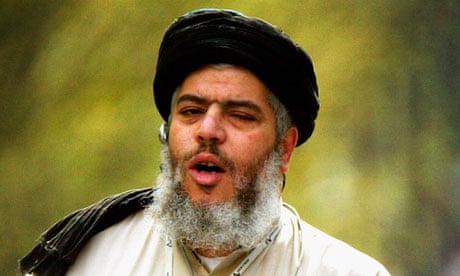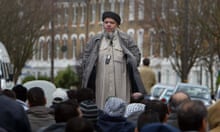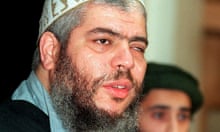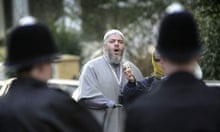The BBC has apologised to the Queen after its security correspondent recounted a private conversation in which the monarch told him she had lobbied a home secretary to secure the arrest of Abu Hamza al-Masri, the radical Islamist cleric.
Frank Gardner said the monarch personally told him she was aghast that Abu Hamza, who faces imminent extradition to the US, could not be arrested during the period when he regularly aired vehemently anti-British views as imam of Finsbury Park mosque in north London.
The Queen never expresses overtly political views herself, and the convention for people conversing with her, for example at palace receptions or other meetings, is that whatever is said remains off the record.
During an interview with BBC Radio 4's Today programme about the wider issue of the 54-year-old's newly approved extradition to the US, Gardner said of Abu Hamza's former activities that there was a sense MI5 had been too slow to realise how dangerous he was in radicalising other people.
Gardner continued: "Actually, I can tell you that the Queen was pretty upset that there was no way to arrest him. She couldn't understand – surely there had been some law that he had broken? In the end, sure enough, there was. He was eventually convicted and sentenced for seven years for soliciting murder and racial hatred."
A clearly surprised James Naughtie, interviewing Gardner, described this revelation as "a corker". Gardner said: "Yes, I thought I'd drop that in. She told me."
Gardner said: "She spoke to the home secretary at the time and said, surely this man must have broken some laws. Why is he still at large? He was conducting these radical activities and he called Britain a toilet. He was incredibly anti-British and yet he was sucking up money from this country for a long time. He was a huge embarrassment to Muslims, who condemned him."
The BBC reported that the corporation had written to Buckingham Palace to express their regret and that the conversation should have stayed private. Gardner's comments were "wholly inappropriate", the letter said, adding that the BBC correspondent was personally very sorry.
A Buckingham Palace spokeswoman said she had no comment on Gardner's interview.
Gardner did not specify which home secretary was lobbied, but it appears most likely to be David Blunkett, who held the post from 2001 to 2004, at the peak of Abu Hamza's infamy before he was arrested. Following his initial arrest in August 2004, Abu Hamza was convicted in 2006 of 11 charges connected to soliciting murder and inciting racial hatred.
Blunkett, who is in the United States, said: "I can categorically state that the Queen never raised the issue of Abu Hamza with me. Not surprisingly because my views and attitude in relation to this individual were very well known."
A spokeswoman for Blunkett said that when he was at the Department for Work and Pensions from May to June 2005 he "stamped on Abu Hamza being entitled to benefits".
A spokesman for the republican pressure group Republic said the comments, if true, showed the monarch had needlessly "waded into the debate". He said: "It is up to parliament and the courts to deal with these complex issues, not the Queen. Monarchists argue the Queen always remains above politics. Clearly that is not the case."
The government has battled for eight years to secure Hamza's extradition to the US, where he is wanted in connection with alleged plans to establish a terrorist training camp in Oregon, as well as claims he provided material support to the Taliban. He is also wanted in connection with allegations that he was involved in hostage-taking in Yemen in 1998.
Abu Hamza's fight against extradition ended on Monday when the European court of human rights rejected his appeal, as well as those of four other terrorism suspects, and agreed an earlier ruling that their human rights would not be violated by the prospect of life sentences and solitary confinement in a US prison.
The Queen's political views
Gardner's first-hand account of the Queen's specific views on a politically charged subject is notable for two reasons: firstly, the idea of the monarch directly lobbying a home secretary on so specific a subject, but also the sheer rarity of hearing her opinions at all.
Unlike Prince Charles and, to a lesser if more indiscreet extent, Prince Philip, the Queen more or less never expresses an overtly political view, barring perhaps her support for the 1982 Falklands war, in which the involvement of her own son, Prince Andrew, added a personal element.
This is not because she is not interested in such affairs, or informed: David Cameron is now the 12th prime minister with whom she has discussed the issues of the day in weekly chats. Yet such is the perceived importance of the political neutrality of her constitutional role, and the iron-clad convention that conversations with her remain unreported, that virtually no royal opinions leak out.
What does emerge is generally the personal: the official Downing Street website, for example, notes her warmer relations with some prime ministers, such as James Callaghan, than others, like Ted Heath.
Anything more political generally emerges, at best, via second-hand sources. Last year the former partner of Denis MacShane, Europe minister in the last Labour government, recounted the Queen saying at a Buckingham Palace drinks party that she opposed Turkey's EU membership. A 1996 book by the historian Ben Pimlott, based on interviews with royal courtiers and friends, portrayed her as almost left-leaning, supposedly questioning the wisdom of the Suez intervention and Margaret Thatcher's policies towards poor people.






Comments (…)
Sign in or create your Guardian account to join the discussion